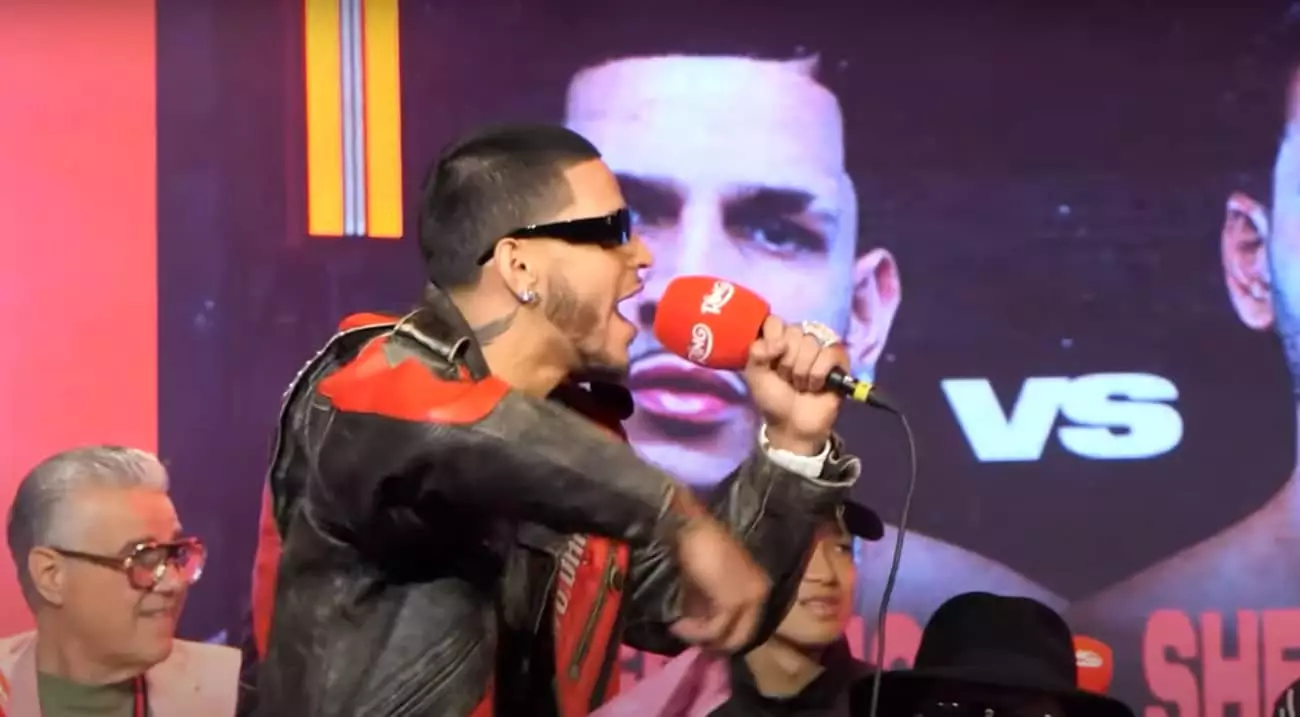In recent years, boxing press conferences—once arenas of tactical discourse and respectful banter—have transformed into battlegrounds of spectacle and sensationalism. The recent episode in New York exemplifies this shift, highlighting how fighters now often prioritize showmanship over sportsmanship. Edgar Berlanga’s incendiary outburst against promoter Oscar De La Hoya underscores a broader trend where confrontational antics are weaponized to generate buzz, sometimes at the expense of the sport’s integrity. This disturbing pivot towards spectacle signifies not just a superficial clash of egos but also a deeper cultural shift that devalues discipline and focus in pursuit of viral moments.
The incident’s core reveals a troubling dichotomy. Berlanga, instead of channeling his energy into refining his craft or preparing diligently for his upcoming fight, chose to engage in petulant name-calling, insults, and even throwing a woman’s wig as a weapon. Such actions, while ostensibly aimed at humiliating De La Hoya, ultimately reflect a craving for attention and validation in an era where controversy often elevates profiles faster than skill ever could. This phenomenon isn’t unique to boxing; it mirrors a media landscape obsessed with shock value, where fighters are increasingly expected to perform emotional theatrics rather than demonstrate technical mastery.
The Erosion of Respect: Consequences for the Sport
The exchange between Berlanga and De La Hoya displays a disturbing erosion of respect—an element once fundamental to boxing’s credibility. Oscar De La Hoya, a revered figure in boxing history, was subjected to blatant disrespect, including being called a “stripper,” referencing a scandal from his past, and being insulted based on perceived ethnicity and authenticity. Instead of addressing competitive issues or a serious promotional conflict, Berlanga chose to attack De La Hoya personally, revealing a broader malaise in how fighters approach their careers and public interactions.
This behavior’s consequences ripple beyond the immediate spectacle. As younger fans witness such antics, they may see boxing more as an arena for personal vendettas and social media drama than as a disciplined sport. It risks undermining the sport’s reputation, causing audiences to question whether the focus remains on athletic excellence or devolves into petty provocation. In the long run, this shift diminishes the sport’s prestige, making it harder for fighters to earn the respect they deserve solely based on their skills and dedication.
The Cult of Controversy: A Double-Edged Sword
While Berlanga’s antics might garner short-term attention, they pose significant risks to his career and the sport at large. Antagonistic behavior—particularly when it crosses into disrespect or violence—can alienate officials, promoters, and even fans who prize boxing’s history of honor and discipline. Berlanga’s focus appears misaligned; instead of concentrating on honing his boxing ability or preparing for his match against Sheeraz, he’s distracted by a manufactured feud with a legendary figure.
Moreover, the spectacle risks overshadowing the upcoming bouts. The audience’s expectation for stellar competition is now frequently muddled by sideshows that often dilute the sport’s seriousness. Promoters and fighters must ask: is this theatrical stunt worth the potential damage to reputation? Or is it merely a fleeting hype moment that subsides once the cameras turn off? The danger lies in normalizing such disruptions, ultimately promoting a culture where trash talking and stunts take precedence over skill, training, and respect.
Reflections on Authenticity and Future Directions
This incident should serve as a wake-up call for boxing’s stakeholders. The sport thrives on rivalry, competition, and respect—values that should be emphasized instead of sensational pranks and insults. Real champions elevate boxing with their skill, resilience, and character; they don’t need to resort to petty insults or childish antics to command attention.
Perhaps it’s time for boxing officials, trainers, and broadcasters to reevaluate how they present the sport. Emphasizing sportsmanship and integrity might restore some of the dignity that has been eroded over recent years. Fans crave authenticity—fighters who fight hard in the ring and conduct themselves honorably outside it. The current trend of chaos and controversy, while lucrative in the short term, jeopardizes the sport’s long-term credibility.
In the end, boxing’s true power lies not in spectacle but in its capacity to inspire, challenge, and elevate human potential. The upcoming fights between Stevenson and Zepeda, Berlanga and Sheeraz, should be about showcasing skill and determination, not about who can create the loudest spectacle. Only by refocusing on excellence can boxing reclaim its rightful place as a respected and revered sport.

